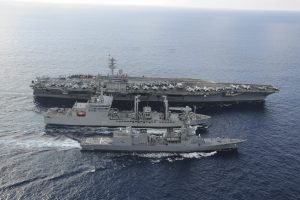China’s recent assertive behavior is proving to be a major strategic blunder. It is hardening the attitudes of other countries toward Beijing, and making it more difficult for China to exploit its growing power. One of the clearest examples of this is India being increasingly drawn toward the orbit of the United States and its allies. India had already been inching toward this reality, but as its belligerent neighbor makes consistent incursions into its territory, the country’s instinctive drive to remain unaligned to major power blocs is now being seen in New Delhi as no longer serving India’s interests.
In the latest demonstration of this movement — as is being reported in the Indian press — New Delhi may soon invite Australia to become a participant in its annual Malabar naval exercise, alongside the United States and Japan. This will generate a formal and practical security application for the long-discussed “Quad” grouping of the four maritime-capable Indo-Pacific democracies.
Australia last participated in what was originally an India-U.S. bilateral exercise in 2007. Japan’s participation was regularized in 2015, but India had been cool toward Australia’s wishes to make Malabar a quadrilateral exercise, wary of provoking Beijing. This wariness has now dissipated.
China has seen the growing security cooperation between the U.S., India, Japan, and Australia as a containment strategy. It is likely that Beijing will object to such a development, but it’s also likely that New Delhi has factored these objections into its decision-making. The expansion of Malabar is a clear sign of the concerns that India and Australia — as well as Japan and the United States — have about the less secure environment that is emerging in the Indo-Pacific. None of these countries should be shy about admitting this.
Australia and India have been drawing closer to each other for some time now. The decision to include Australia in the Malabar exercises follows closely from the security relationship between the two countries being upgraded to a Comprehensive Strategic Partnership during a virtual summit Prime Ministers Scott Morrison and Narendra Modi held in early June. The summit also concluded a mutual logistics support agreement to allow access to each others’ military bases and ports.
These developments have been at least a decade in the making, with Canberra having made a concerted push to deepen its relationship with India. Australia’s 2017 foreign policy white paper recognized India as a country of “first order” importance. Despite political developments in India that are complicating Australia’s “shared values” with India, there are still considerable “shared interests” to drive the relationship, maritime security being first among them.
While Australia may like to project itself as a two-ocean power, in reality the Indian Ocean is Australia’s second sea. Its population — and export markets — is heavily weighted toward the Pacific and its maritime and security perspectives obviously follow. Yet, Australia would also recognize that the Indian Ocean is an increasingly contested geostrategic space, and be wary of China’s ambitions and increasing capabilities through the region, as well as the influence it is developing in states of the South Asian littoral.
While its own capacities in the Indian Ocean may not be extensive, Australia should be willing to support New Delhi’s self-identification as the rightful resident power in the Indian Ocean. With this there are significant opportunities for the two countries to coordinate. As Darshana Baruah recently detailed for War On The Rocks, India’s Andaman and Nicobar Islands and Australia’s Cocos (Keeling) Islands are strategically positioned to allow both countries to maintain significant maritime awareness in the major chokepoints in the eastern Indian Ocean. The newly signed mutual logistical support agreement would allow for the two navies to cooperate more effectively for this purpose.
Canberra and New Delhi are gravitating toward maritime cooperation because it is the area where both countries have considerable natural advantages, with significant coastlines as well as the above mentioned well-placed island territories. Last year’s bilateral AUSINDEX naval exercises were the largest and most complex since they were established in 2015, with a notable focus on anti-submarine warfare, given China’s increasing capabilities in this area.
However, Malabar is India’s flagship cooperative naval exercise, which indicates the invitation for Australia to participate is a significant intensification of the relationship. It also provides the opportunity for New Delhi, Canberra, Washington, and Tokyo to expand their information and intelligence sharing, naval interoperability, and habits of cooperation. Cooperation is the key element to these exercises.
India is moving toward seeing the advantages of alliances. Australia’s defense and foreign policies are structured around building and maintaining alliances, and despite some past difficulties in the relationship, New Delhi is now starting to see Canberra as a capable and reliable partner. Especially attractive for New Delhi is Australia’s willingness to stand up to the assertive behavior from China that India is now finding highly problematic. While China may be disgruntled at this move to regularize the naval cooperation between the four democracies, and will protest what it — correctly — see as a containment strategy, Beijing really only has itself to blame.

































